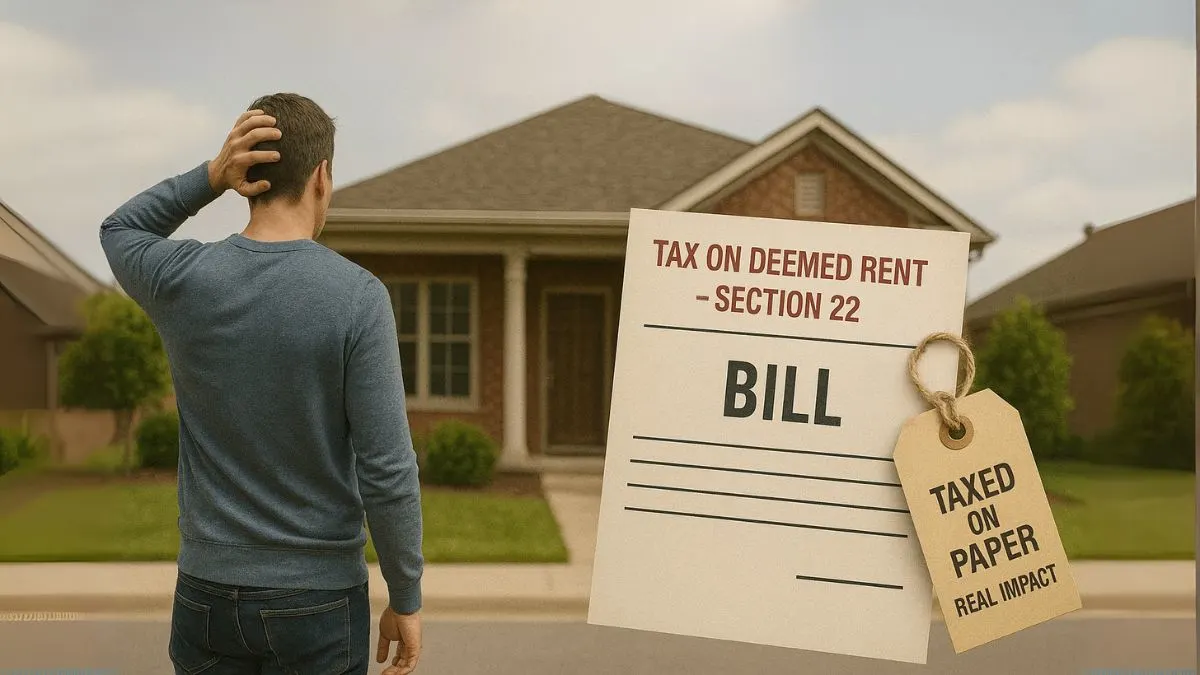
Most people believe that if a property is not generating any rental income, it shouldn’t be taxed. But here’s the twist — the Indian Income Tax Act thinks otherwise. If you own more than one house, you may have to pay tax even when a property is lying empty. Surprising? That’s where Section 22 of the Income Tax Act steps in.
This section plays a key role in how property owners are taxed on the income derived — or not derived — from their buildings. Whether it’s a house you’ve rented out, your second flat that’s unoccupied, or a property used for personal purposes, this section determines the tax implications of all of them.
What Is Section 22 of the Income Tax Act?
Section 22 of the Income Tax Act, 1961, governs how income from house property is taxed. It essentially states that the annual value of any building or land attached to a building — if owned by a person — shall be chargeable to tax under the head “Income from House Property.”
It doesn’t matter whether you’ve earned income from the property or not. What matters is whether the property is deemed to have potential income, such as rent."
So, if you have a second property that’s not rented out, the government assumes you could have rented it. Based on that assumption, you’re liable to pay tax on the expected rent. This is called notional income or deemed rent.
What Type of Property Is Taxed Under Section 22?
This section covers all types of house property — a residential apartment, an office building, a godown, or even a farmhouse, as long as it includes a building & is not used for business purposes.
The term “house property” under this section includes:
- Buildings & structures
- Land attached to these buildings (like garages, gardens, parking areas)
- Flats or homes that you partially or wholly own
However, vacant land with no structure is not taxable under Section 22.
How Income is Calculated under Section 22
Let’s break it down with a simple explanation.
If you own one property & it is self-occupied, the annual value of that property is considered nil; no tax is payable.
But if you own two or more properties, only one can be claimed as self-occupied. The remaining ones will be treated as deemed let out, even if they are not rented. Tax will then be calculated based on the expected rent the property could have earned.
In case of an actual let-out property, the rent received becomes the taxable income under this section. If you’ve rented out a house for ₹25,000 per month, the annual rental income (minus allowed deductions) becomes taxable.
Example of Deemed Rent Taxation
Let’s say you own:
- Flat A: Self-occupied"
- Flat B: Left vacant
- Flat C: Rented for ₹20,000/month
You can claim Flat A as self-occupied, meaning no tax on it. Flat B, though vacant, will still be taxed under Section 22 on notional income. Flat C’s rent is taxable as actual rental income.
This treatment applies because, as per the law, leaving houses empty when there's potential to earn rental income is seen as a loss of tax revenue to the government."
Are There Any Exemptions Under Section 22?
Yes, if the property is used for the owner’s own business or profession, & the income from that business is taxable under “Profits & Gains of Business or Profession,” then the property is not taxed under Section 22.
Also, if you only own one house & it is self-occupied, you are exempt from tax under this section.
Key Highlights You Should Know
- The law defines income from house property broadly. It includes ownership of buildings, whether or not they are earning actual income.
- You are taxed based on the annual value, not just actual rent.
- Deemed rent applies when a property is vacant but not self-occupied.
- You can only claim one house as self-occupied for tax exemption purposes.
Understanding this section is especially important for salaried individuals with multiple properties or those planning to invest in real estate for long-term gains.
FAQs
Q1. What is meant by income from house property under Section 22?
It is the annual value of a property you own, whether rented or not, unless used for business purposes.
Q2. Is vacant property taxable under this section?
Yes, if it is not claimed as self-occupied, the tax is charged on notional rent (deemed income).
Q3. How many properties can be claimed as self-occupied?
Only one. Others will be taxed based on expected rental value.
Q4. What about property used for business?
If a building is used for your own business or profession, Section 22 will not apply.
Final Thoughts
Section 22 is a crucial section for property owners, especially in metro cities where people often own more than one residential property. Not knowing about deemed rental income & its taxability can lead to unnecessary notices from the Income Tax Department. Whether you're managing rental properties or navigating second home taxes, understanding this section helps you stay compliant & plan better.
👉 Let the experts at Callmyca.com help you navigate the rules, save taxes, & avoid surprises. Speak to a CA today — your house shouldn’t cost you more in taxes than it earns in rent!











